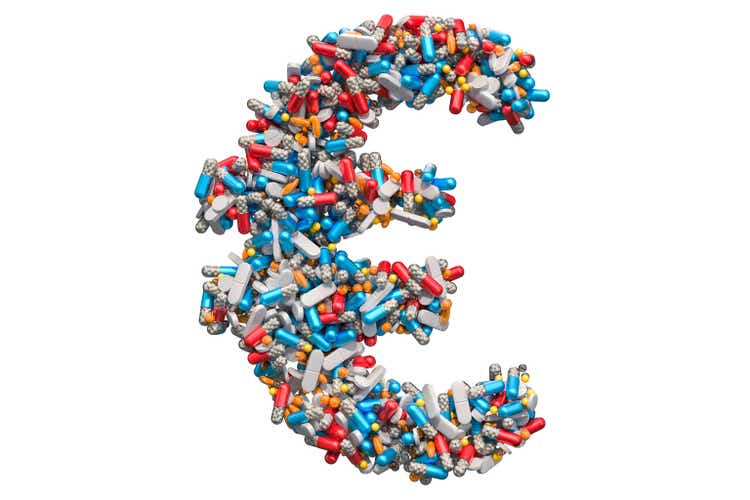AlexLMX/iStock via Getty Images
Like most of the rest of the stock market, the third quarter is one to forget for major European pharmaceutical companies.
In Q3 2022, the S&P 500 was down ~5%. The SPDR MSCI Europe Health Care UCITS ETF, whose primary listing on Euronext Paris (ticker: STW), fared even worse, down 8% for the quarter. Its top 10 holdings are among the largest European pharmas based on market cap.
Europe’s biggest drug company, Roche (OTCQX:RHHBY)(OTCQX:RHHBF), was also the best pharma performer of the quarter, down only 2%.
A major overhang for the company is the impending launch of generics of one of its best selling drugs, Lucentis (ranibizumab), for age-related macular degeneration. In Q2, Roche (OTCQX:RHHBY) reported US sales of the treatment of CHF 316M ($320.1M), a decline of ~4% from the year-ago period.
On Monday, Coherus BioSciences (CHRS) will launch Cimerli, its biosimilar to Lucentis, in the US. In September, the European Medicines Agency’s recommended approval of Stada’s Ximluci biosimilar in the EU.
Roche is hoping that its follow-in to Lucentis, Vabysmo (faricimab), will blunt some of the blow from Lucentis generics. In Q2, it brought in sales of CHF 109M ($110.4M).
The second best performer of the month was fellow Swiss pharma Novartis (NYSE:NVS), which was down ~9%. While Novartis (NVS) benefitted earlier this year from several US drug approvals — such as Vonjo (pacritinib) and Pluvicto (lutetium Lu 177 vipivotide tetraxetan) — Q3 was much quieter on that front.
In the US in the quarter, the FDA approved a combination of the company’s Tafinlar (dabrafenib) + Mekinist (trametinib) for solid tumors with a certain mutation while in the EU, Scemblix (asciminib) was approved in August for chronic myeloid leukemia.
Novartis (NVS) just hit a 52-week low of $52.10 on Sept. 26. A major lingering concern for the pharma is the potential launch of generics of its blockbuster multiple sclerosis drug, Gilenya (fingolimod). It had 2021 sales of ~$2.8B. On Sept. 29, the US Supreme Court issued a stay on a mandate from an appeals court that would have allowed Gilenya generics.
Just behind Novartis (NVS) was Danish pharma Novo Nordisk (NVO), which was off ~10% in the quarter. A key highlight for the diabetes treatment company was its $1.1B acquisition of Forma Therapeutics (FMTX), which is focused on sickle cell disease.
In September, the company was buoyed by data from a late-stage trial showed that showed once-weekly insulin icodec led to better results compared to its own once-daily Tresiba (insulin degludec).
Novo Nordisk has benefitted immensely since the June 2021 approval of Wegovy (semaglutide) as a weight-loss treatment. In Q2, however, revenue of 1.2B Danish Krone (~$158.2M) compared to 1.4B ($184.5M) in Q1.
Wegovy will also likely soon have competition from Eli Lilly’s Mounjaro (tirzepatide). Although currently only approved for diabetes, Lilly is pursuing approval Mounjaro as a weight-loss treatment. In a head-to-head trial, Mounjaro beat Wegovy in terms of A1C and body weight reductions.
AstraZeneca (NASDAQ:AZN) lost 17% in the quarter. It hit a 52-week low of $52.65 on Sept. 26. The company did have some positive catalysts in the quarter in terms of readouts from several trials looking at expanding indications for several of its oncology treatments. Last month, however, Credit Suisse cut its rating to neutral saying that AstraZeneca’s (AZN) current stock price reflects its oncology potential.
The bottom two large European pharmas, GlaxoSmithKline (NYSE:GSK) and Sanofi (NASDAQ:SNY), lost, respectively, ~18% and ~26% in the quarter. GSK’s (GSK) major event in Q3 was the July spinoff of its consumer healthcare unit into a separately traded company, Haleon (HLN), which is also down significantly since it began trading.
Sanofi (SNY), as well as GSK (GSK) and Haleon (HLN), were also impacted in the quarter by worries over potential legal exposure to lawsuits over the heartburn drug Zantine (ranitidine) and apparent links to unacceptable levels of potential human carcinogen, N-nitrosodimethylamine. The companies have said there is no evidence that Zantac is linked to cancer.
One closely watched European pharma, BioNTech, was down 14% in the quarter. The company, which along with Pfizer (PFE) developed the COVID-19 vaccine Comirnaty, has been dealing with declining sales of the shots.
Image and article originally from seekingalpha.com. Read the original article here.


